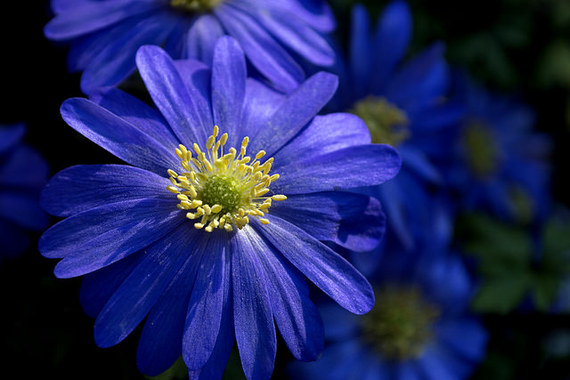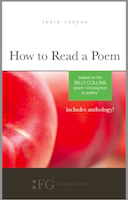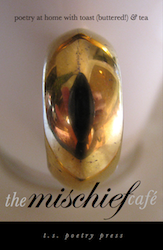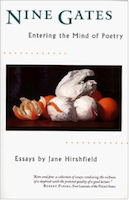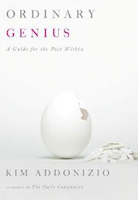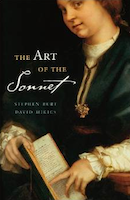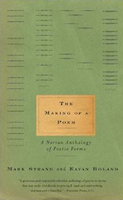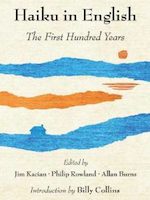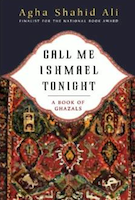Photo by Paul Van de Velde, Creative Commons, via Flickr.
National Poetry Month is just a few weeks away. While you wait for the celebration to begin, you might want to get some great titles and tools onto your list (or your laptop).
Check out these ten terrific recommendations, and try your hand at everything from new writing challenges to new reading experiences. Or, if you're a teacher, add these resources to tutor yourself or your students.
10 Terrific National Poetry Month Titles & Tools
One of the biggest barriers to reading poetry is a feeling that it's too hard to understand. On top of that, many of us learned that a poem was something to be tortured for every ounce of tone and figurative language it might yield, generally for the purposes of finding the "right answers" about or the "true meanings" of poems.
Billy Collins's humorous poem "Introduction to Poetry" plays with these sometimes unpleasant approaches to reading poems. Tania Runyan's book then plays with "Introduction to Poetry," to bring us more satisfying ways of interacting with poems.
While the book can be used to teach someone how to read a poem, it is also a beautiful invitation to step inside of poems for the pure pleasure of it. Perfect for National Poetry Month, which tries to cultivate a love of poetry. Delightful anthology included.
2. The Mischief Café: Poetry at Home with Toast (Buttered!) and Tea, editor L.L. Barkat
If poetry is really going to become part of our lives--and that is the deep wish behind National Poetry Month--we probably need to bring it home and discover the joy of sharing it with others. So maybe it's time to think: poetry book club as opposed to just attending poetry readings (which many people will never do in any case).
This title gets you started in bringing poetry home and reading it with friends, along with the tasty accompaniments of toast, tea, and a dash of mischief. The book outlines how to run a simple "mischief café" poetry experience at home and provides poems to read and prompts to write by if your group is feeling a little adventurous.
Teachers will find the book helpful, too, in making poetry an approachable experience --not to mention the promise of cinnamon. You can download a free digital copy of The Mischief Café for National Poetry Month, but of course the real fun is writing in the book, so a print copy is ultimately recommended.
3. Five Invaluable Word Tools for Poets
A number of people choose to write a poem a day for National Poetry Month. You can do this just for fun, or you can try to increase your poetic skills (but simply writing every day probably won't do the trick). To bring your writing to the next level, we recommend trying one of these five invaluable word tools for poets. Combine your efforts with the jealous poem stack approach, and see if National Poetry Month might become the month you made a poetic skill leap.
4. Nine Gates: Entering the Mind of Poetry, Essays, by Jane Hirshfield
This title is for more advanced readers, ready to take their understanding of poetry to new heights. The essays are complex, thoughtful, inspiring (I decided I must try to translate my own volume of Neruda after reading the chapter on translations--maybe I should start that *this* National Poetry Month).
Some of the topics covered--though it feels odd to call them topics when they're accompanied by such a depth of rumination--are: poetry and the mind of concentration, the question of originality, and poetry as a vessel of remembrance. This is definitely a good title to read for fun, if part of your version of fun is to expand your mind.
5. Ordinary Genius: A Guide for the Poet Within, by Kim Addonizio
Packed full of exercises and prompts, this title teaches poetry craft--including structure, rhythm, metaphor, and revision. It also gives you plenty of space to play. As a way to celebrate National Poetry Month, the book is for poets interested in coming at poetry from a variety of angles or for writer's groups, poetry book clubs, and teachers looking for mature prompts.
6. Every Day Poems
Many people like poetry and would like to join a poetry reading challenge for National Poetry Month, but they aren't sure where to find excellent poems. Who to read? Where to start? What to read for this season or that?
Every Day Poems solves the problem of finding great poetry and makes it easy to receive a poem a day Monday through Friday, right in your inbox. Discover beautiful classics, great poems from emerging poets, poems by theme and season--all accompanied by lovely art and photography. National Poetry month is the ideal time to begin this daily poetry habit, and Every Day Poems makes it simple.
7. The Art of the Sonnet, by Stephen Burt and David Mikics
A great project to undertake for National Poetry Month is to concentrate on a single form, both reading and writing it. This book includes one hundred exemplary English language sonnets and a few sonnets in translation. It represents highlights in the history of the sonnet, accompanied by short commentaries on each of the poems. Burt and Mikics offer new perspectives and insights and serve as guides to some of the most popular sonnets in English, as well as lesser-known treasures by nineteenth- and twentieth-century poets.
8. The Making of a Poem: A Norton Anthology of Poetic Forms, editor Eavan Boland
This is the title my daughter stole away from me when she was twelve years old. It opened a whole new world to a girl who thought she didn't have it in her to be a poet. Before long, she was writing sonnets, sestinas, villanelles and more. If you've never tried writing form poetry, this National Poetry Month might be the time to give it a shot. Let Norton be your guide.
9. Haiku in English: The First Hundred Years, editor Jim Kacian
It's not uncommon for people to write a short poem a day for National Poetry Month. Haiku is an obvious choice, but it's a form with more nuance than initially meets the eye. This book is definitely a top haiku resource if you want to understand more of the nuances. It includes excellent poems arranged chronologically, so you can see the unfolding of the form over time in (American) English. It has an amusing and informative introduction by Billy Collins. And it sports a brief history of haiku that touches on such subjects as, What is haiku?, the first haiku written in English, the Beats and haiku, the haiku community, and the globalization of haiku. That might be more than you wanted to chew for haiku, but again, it's NPM and that's a great time to go beyond mere sampling.
10. Call Me Ishmael Tonight: A Book of Ghazals, by Agha Shahid Ali
As with other kinds of form poems, learning how to write a ghazal (an admirable goal for National Poetry Month!) will be made simpler by first immersing yourself in beautiful examples of the form. Agha Shahid Ali's ghazals are moving, unique, sometimes darkly playful examples of an originally Persian form that can be described as autonomous or semi-autonomous couplets with an emotional coherence--like gems one could "pluck from the ghazal's necklace."
____
This post is a modified reprint of a post that originally ran at Tweetspeak Poetry.
